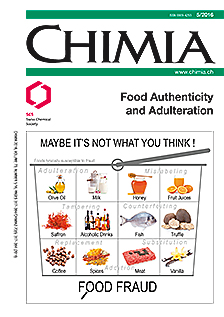Protocatechuic Acid Levels Discriminate Between Organic and Conventional Wheat from Denmark
DOI:
https://doi.org/10.2533/chimia.2016.360Keywords:
Cereals, Food adulteration, Food fraud, Liquid chromatography, Phenolic acids, WheatAbstract
Organic wheat retails at higher market prices than the conventionally grown counterparts. In view of fair competition and sustainable consumer confidence, the organic nature of organic wheat needs to be assured. Amongst other controls this requires analytical tests based on discriminating traits. In this paper, phenolic acids were examined by liquid chromatography analysis as biomarkers for discriminating between the two groups by means of a controlled grown full factorial design Danish wheat sample set. By combining baseline and retention-time correction pre-treatments and principal component analysis, discrimination between organic and conventional produce was found to be expressed in the first principal component (93%), whilst the second principal component accounted for the production year (4%). Upon examination of the loadings plot, a single chromatographic peak was found to account for a large part in the discrimination between the two wheat production systems. This was further underpinned by statistically significant differences found in concentrations between the organic and conventional production systems of this phenolic acid (ANOVA, P<0.05). The phenolic acid was tentatively identified as protocatechuic acid by negative mode mass spectrometry. The results obtained implied that protocatechuic acid may serve as a single marker for discrimination between organic and conventional produced wheat.Downloads
Published
2016-05-25
Issue
Section
Scientific Articles
License
Copyright (c) 2016 Swiss Chemical Society

This work is licensed under a Creative Commons Attribution-NonCommercial 4.0 International License.
How to Cite
[1]
Chimia 2016, 70, 360, DOI: 10.2533/chimia.2016.360.







